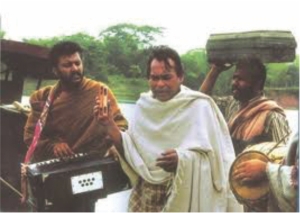| Home - Back Issues - The Team - Contact Us |
 |
| Volume 11 |Issue 08| February 24, 2012 | |
|
|
Tribute A Complete Actor Humayun Faridi's friends and co-workers share their memories of the exceptional actor Tamanna Khan
Everyone despised Kankata Ramzan, a character of the drama serial 'Shongshaptak' aired during Bangladesh Television's era. “Humanyun Faridi played the role of Kankata Ramzan. Just like Mir Jafar has become a synonymous word for a traitor, Ramzan became a swear word referring to an insolent character," says renowned director Nawazish Ali Khan, Advisor (Programme), ATNBangla Ltd. “Humayun Faridi took the role to a level that it became a symbol,” he adds. In a country where dedicating one's life to the performing arts is dispirited, Humayun Faridi embraced acting in all forms. He set trends in all forms of media – theatre, television and film, breaking conventions and stereotypes, challenging himself with new roles and dimensions. "Faridi was discovered by eminent dramatist Nasiruddin Yusuf Bachchu, who had gone as a judge to Jahangirnagar University (JU) where a play written, directed and acted by Humayun Faridi was staged," says renowned theatre-artiste Shimul Yusuf, Faridi's co-artiste at Dhaka Theatre. Bachhcu's choice has been proved right. Starting with 'Shakuntala' where Faridi played the role of Takkhak, he never had to look back. Rather, he began to explore his talents. “Faridi had asthma so he faced difficulty in saying long dialogues in a breath. Therefore he began to scan the dialogues so intelligently that scanning soon became a style,” Shimul Yusuf says explaining Faridi's technique of throwing long dialogues with small hidden breaths. “He used to improvise a lot during his performance,” recalls Yusuf. She mentions how Faridi would throw challenges at his co-artistes, setting off a game of improvisation on stage. She refers to the play 'Muntasir' where Faridi played the title role and Yusuf that of a nurse. Describing a sequence from the play where Muntasir has escaped from his cabin and has been found out by the nurse, she says that usually she would shout 'found him' and place her fingers lightly on his shoulder. In reply, Faridi used to ask 'who are you' and on receiving the answer 'nurse', he used to say 'Naash! Naashpati (pear)! I want to eat Naashpati (pear)'.
“During one such performance, he suddenly bit my finger, immediately after his dialogue. I was so astounded that I instinctively exclaimed, 'ki ashchorjya?' He retorted, 'ami ashchorjya khabo na ami shorbonash khabo (I don't want to eat wonder, I want to eat disaster). At that instance, I felt that he really was Muntasir and he would gobble me up too,” Yusuf reminisces. Such was their game of improvisation. Like all great actors, Faridi became the character he played, Khan says, fondly remembering the actor's works. He recalls Faridi's role as a retired primary school headmaster from the village in the Bangladesh Television drama “Osomoy” directed by Khan and written by Humayun Ahmed. “Bichitra, a popular magazine of that time had possibly ranked it as the best drama of the year.” The drama received such accolades that it was sent to a competition abroad with sub-titles, Khan informs.
Khan recalls how during the discussion of the make-up and wardrobe of his character, Faridi turned up with a brilliant idea, one in many examples of his keen interest to accurately portray the character that he was playing. Khan says, “He suggested that village elders usually have white accumulation of fluids sticking at the corners of their eyes. We were worried what he would apply and how, because the substance might prove harmful to the eyes.” Faridi, however, did apply a white substance with a match-stick, proving once again how characterisation mattered to him, even if it posed some risk to his well being.
He would never settle for the average. Shahidul Islam Khokon, who first presented Faridi in the mainstream commercial movies, shares an instance where Faridi himself insisted on a retake. “One day during a shot, I muttered, 'cut it', as I thought the shot was ok. Both he (Faridi) and his former wife (Subarna Mustafa) declined. He said that the shot was not ok and that he would redo it. When I asked why, he insisted on retaking the shot,” he reminisces. “Cut!” Khokon says in a deep, strong tone, at Faridi's funeral, mimicking the way the actor had expressed his satisfaction after the second take. Faridi later told him that he volunteered a retake because he guessed Khokon's discontent of the first take from his tone. “I still cannot believe that he is no more,” Khokon grieves. The highly praised and respected actor quietly left his bereaved fans, friends and family on February 13, 2012, when, at 60, he breathed his last at his Dhanmondi residence. His death came as a shock to his compatriots, his near and dear ones. Renowned actor, Afzal Hossain, Faridi's friend and co-artiste from the entertainment world, opines, “He was a complete actor. Not that he tried to be an actor. He was a born actor.” Hossain says Faridi had taken acting as his religion. “Many of us do other stuff besides acting, but not Faridi. He had never tried to do anything else other than acting,” he stresses. Anguish drips off Afzal voice as he says how Faridi, in spite of his busy schedules, was never content. His craving for acting took him to all the mediums of the entertainment world even at the expense of disapproval of his theatre friends. "He left theatre because of asthma," explains Hossain, "and busied himself at television.” However, Faridi did not limit himself there. While theatre and television artistes usually stay away from mainstream Bangladeshi cinema, Faridi freed himself from that tradition. When Khokhon offered him the role of a villain in his film 'Din-Mojur', Faridi almost immediately agreed. “I asked him about the kind of role he wants. He asked for a character that did not drink alcohol, smoked cigarettes or even looked at women but had an extremely dark side to himself,” recalls Khokon. A year after the discussion, Khokon offered him such a character in Din-Mojur and signed him at the highest paying rate given to villains in the nineties. After a few days of shooting, Khokon signed him in three more pictures — 'Shantrash', 'Top Raangbaaz' and 'Bish Daat'.
“Usually, when an actor's first movie becomes a hit, his demand increases. 'Din-Mojur' was released later and it was a flop. 'Shantrash' which was released earlier became a mega-hit and it is said that it sold in Humayun Faridi's name,” Khokon fondly remembers. Such was Humayun Faridi's acting that it broke all trends. People flocked to the cinema halls not to see the hero but the villain. Faridi's yearning to reach the masses was fullfilled.
Yet his thirst to explore more was not quenched. He was constantly on the look out for different and challenging roles. He broke the conventional perception of a hero by playing the lead role in the television drama Setu Kahini written by Afzal Hossain. “It was a time when we were young and wanted to experiment. Many people criticised it, saying that I gave him the lead role because he was my friend. But later he played the protagonist in many other dramas," he says. However, it was difficult to tame the rebel inside Faridi. He never listened to anyone. He led his life his own way. “He was always against the regular in every aspect. We used to consider his ways as madness. He was special. Sometimes we might have thought that what he was doing was wrong, but that was our mistake. He did what he felt was right. I believe that there is only one life and he did not want to live his life like anyone else. He lived his life in his own way not like anyone else's,” comments Hossain.
Copyright
(R) thedailystar.net 2012 |
||||||||||||||||
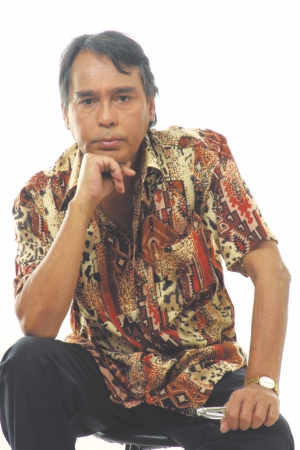
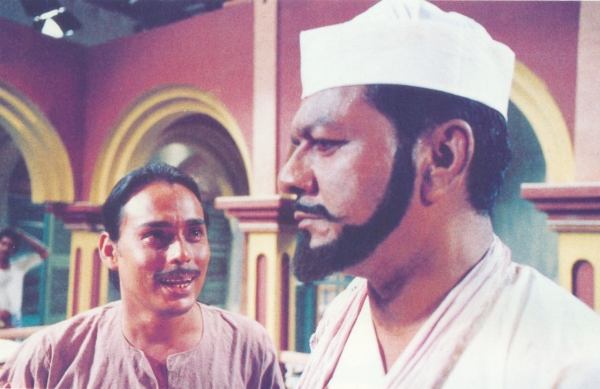
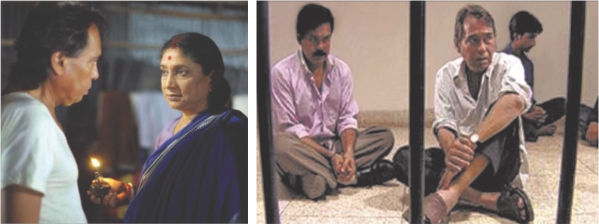
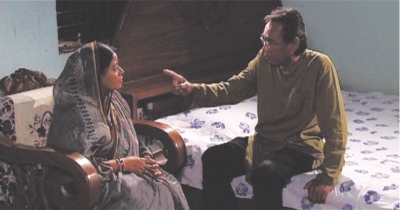
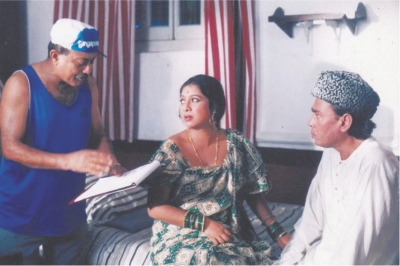
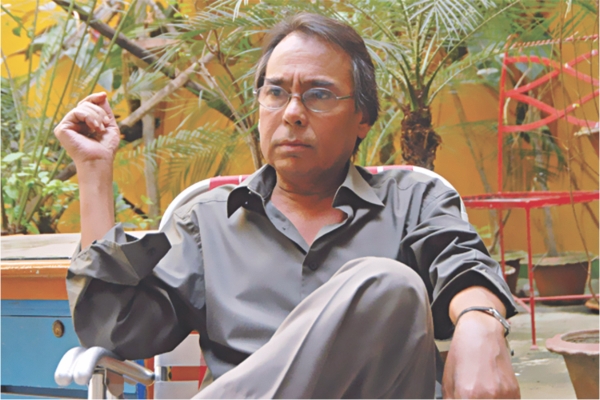 A
A 